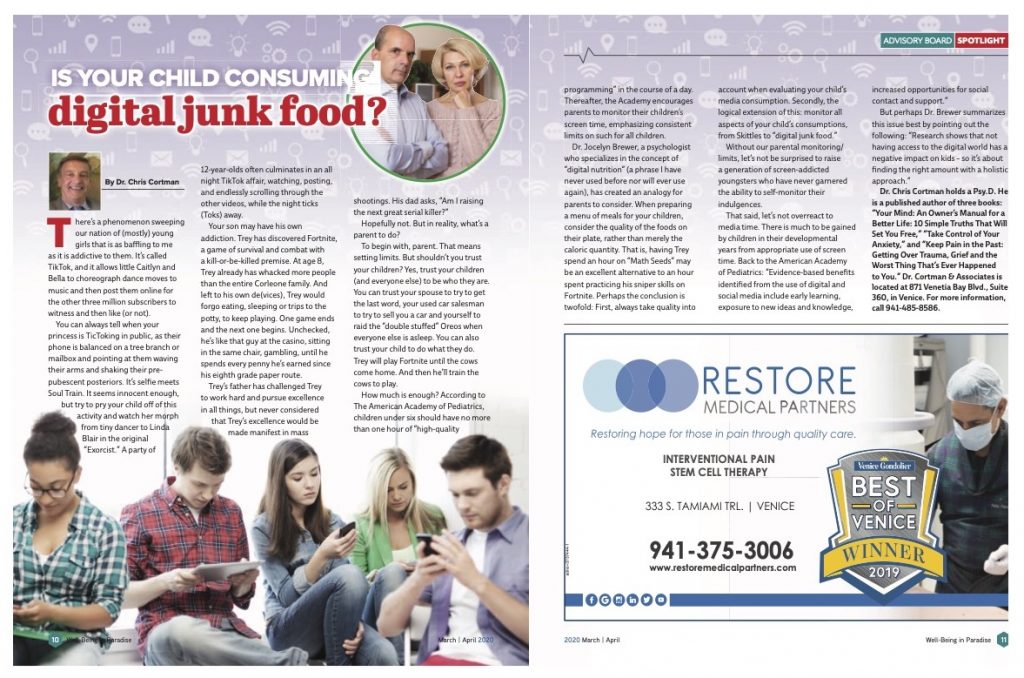Article written for the Venice Gondolier’s Well Being in Paradise Magazine | March/April 2020
You can always tell when your princess is TicToking in public, as their phone is balanced on a tree branch or mailbox and pointing at them waving their arms and shaking their pre-pubescent posteriors. It’s selfie meets Soul Train. It seems innocent enough, but try to pry your child off of this activity and watch her morph from tiny dancer to Linda Blair in the original “Exorcist”. A party of 12-year-olds often culminates in an all night TikTok affair, watching, posting, and endlessly scrolling through the other videos, while the night ticks (Toks) away.
Your son may have his own addiction. Trey has discovered Fortnite, a game of survival and combat with a kill-or-be -killed premise. At age 8, Trey has already whacked more people than the entire Corleone family. And left to his own de(vices), Trey would forgo eating, sleeping or trips to the potty, to keep playing. One game ends and the next one begins. Unchecked, he’s like that guy at the casino, sitting in the same chair, gambling, until he spends every penny he’s earned since his eighth grade paper route. Trey’s father has challenged Trey to work hard and pursue excellence in all things, but never considered that Trey’s excellence would be made manifest in mass shootings. His dad asks, “Am I raising the next great serial killer?“
Hopefully not. But in reality, what’s a parent to do?
To begin with, parent. That means setting limits. But shouldn’t you trust your children? Yes, trust your children (and everyone else) to be who they are. You can trust your spouse to try to get the last word, your used car salesman to try to sell you a car and yourself to raid the “double stuffed” Oreos when everyone else is asleep. You can also trust your child to do what they do. Trey will play Fortnite until the cows come home. And then he’ll train the cows to play.
How much is enough? According to The American Academy of Pediatrics, children under six should have no more than one hour of “high quality programming” in the course of a day. Thereafter, the Academy encourages parents to monitor their children’s screen time, emphasizing consistent limits on such for all children.
Dr Jocelyn Brewer, a psychologist who specializes in the concept of “digital nutrition“ (a phrase I have never used before nor will ever use again), has created an analogy for parents to consider. When preparing a menu of meals for your children, consider the quality of the foods on their plate, rather than merely the caloric quantity. That is, having Trey spend an hour on “Math Seeds” may be an excellent alternative to an hour spent practicing his sniper skills on Fortnite. Perhaps the conclusion is twofold: First, always take quality into account when evaluating your child’s media consumption. Secondly, the logical extension of this : monitor all aspects of your child’s consumptions, from Skittles to “digital junk food”.Without our parental monitoring /limits, let’s not be surprised to raise a generation of screen addicted youngsters who have never garnered the ability to self -monitor their indulgences.
That said, let’s not overreact to media time. There is much to be gained by children in their developmental years from appropriate use of screen time. Back to the American Academy of Pediatrics, “evidence-based benefits identified from the use of digital and social media include early learning, exposure to new ideas and knowledge, increased opportunities for social contact and support.”But perhaps Dr. Brewer summarizes this issue best by pointing out the following: “Research shows that not having access to the digital world has a negative impact on kids – so it’s about finding the right amount with a holistic approach.“

